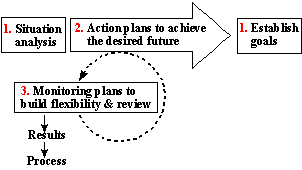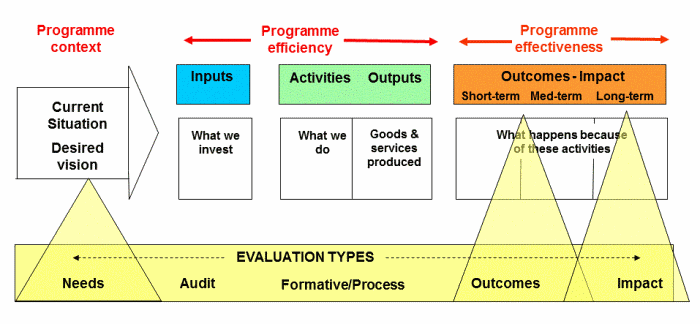Planning, monitoring & evaluation - closing the loop
Planning, monitoring and evaluation are at the heart of a learning-based approach to management. Achieving collaborative, business/environmental or personal goals requires effective planning and follow-through. The plan is effectively a "route-map" from the present to the future. To plan a suitable route you must know where you are (situation analysis) and where you want to go (establish goals and identify outcomes). Only then can appropriate action plans be developed to help achieve the desired future.

However, because the future is uncertain, our action plans must be adaptive and allow continually for "learning by doing". To do this we need appropriate monitoring and evaluation (m&e) tools and processes, and information flows that help the different stakeholders involved check that their efforts are proceeding as planned, and to refine and guide their responses if changes are needed.
Both sets of plans are best developed in conjunction with the people who will carry them out, as they are then more likely to actually do so. As the accompanying diagram shows, there are two sets of monitoring plans needed. Results monitoring focusses on whether you are getting where you want to go, while process monitoring focusses on how efficiently you are geting there. Indicators in this regard may be either qualitative or quantitative, and a combination of the two is often best. An evaluation is like a good story, it needs some (qualitative) anecdotal evidence to put the lesson in context, and some (quantitative) facts and figures that reinforce the message.
The diagram below shows an outcomes or logic model approach to project planning. This describes logical linkages among programme resources, activities, outputs, and audiences, and highlights different orders of outcomes related to a specific problem or situation. Importantly, once a programme has been described in tenns of the logic model, critical measures of perfonnance can be identified. In this way logic models can be seen to support both planning and evaluation. As the diagram below shows different evaluation approaches can be used to measure different parts of the overall project or change intitiative.

| Figure: A project logic model showing how different evaluation types and approaches can be used to measure progress through different stages of implementation |
Often people talk about logic models and theory of change processes interchangeably, Logic models - such as the ones above - connect programmatic activities to client or stakeholder outcomes. But a theory of change goes further, specifying how to create a range of conditions that help programmes deliver on the desired outcomes. These can include setting out the right kinds of partnerships, types of forums, particular kinds of technical assistance, and tools and processes that help people operate more collaboratively and be more results focused.
With the broader monitoring and evaluation context there are a number of framings that will infuence the final approaches chosen. These are highlighted on different pages here. Different types of evaluations answer different questions. Other frameworks which can provide ideas as to the scale and levels of programme intensity to be considered by stakeholders. Within these overall frameworks more examples of different evaluation techniques that can be used can be found from the different approaches page.
Worldwide there is a trend towards an increased use of indicators to monitor development and track progress. Indicators quantify and simplify phenomena, and help us understand and make sense of complex realities. To be most meaningful, a monitoring and evaluation programme should provide insights into cause-and-effect relationships between environmental or socio-economic stressors and the anticipated ecosystem responses and subsequent social and economic outcomes.
Other related pages include links to guides on managing participation and improving facilitation. By fostering good participation in planning, monitoring and evaluation we can support empowerment, motivation and strengthened relationships. This can help in supporting innovative project and development approaches through social learning and adaptive managment.
